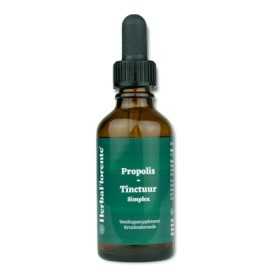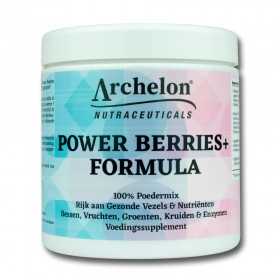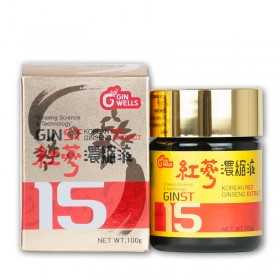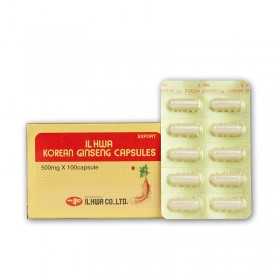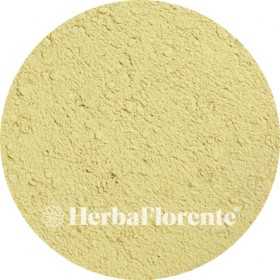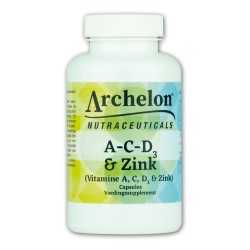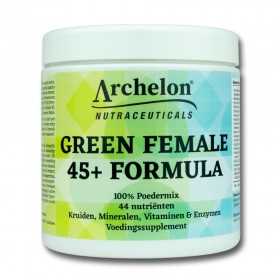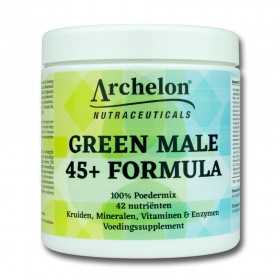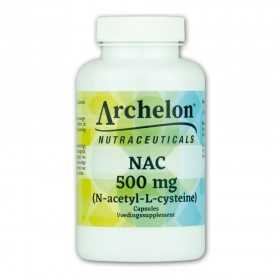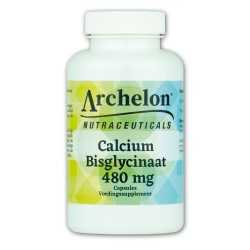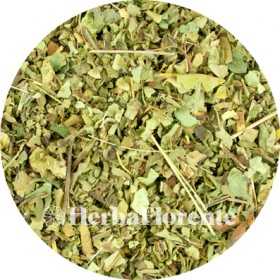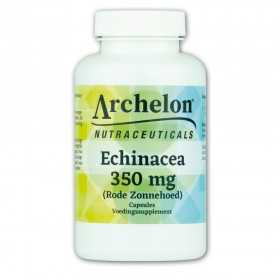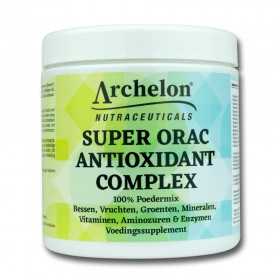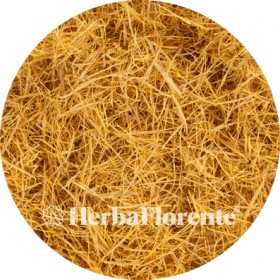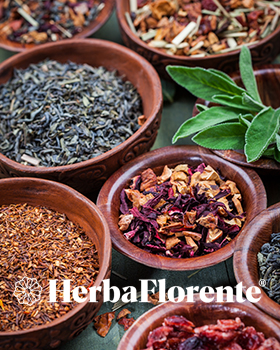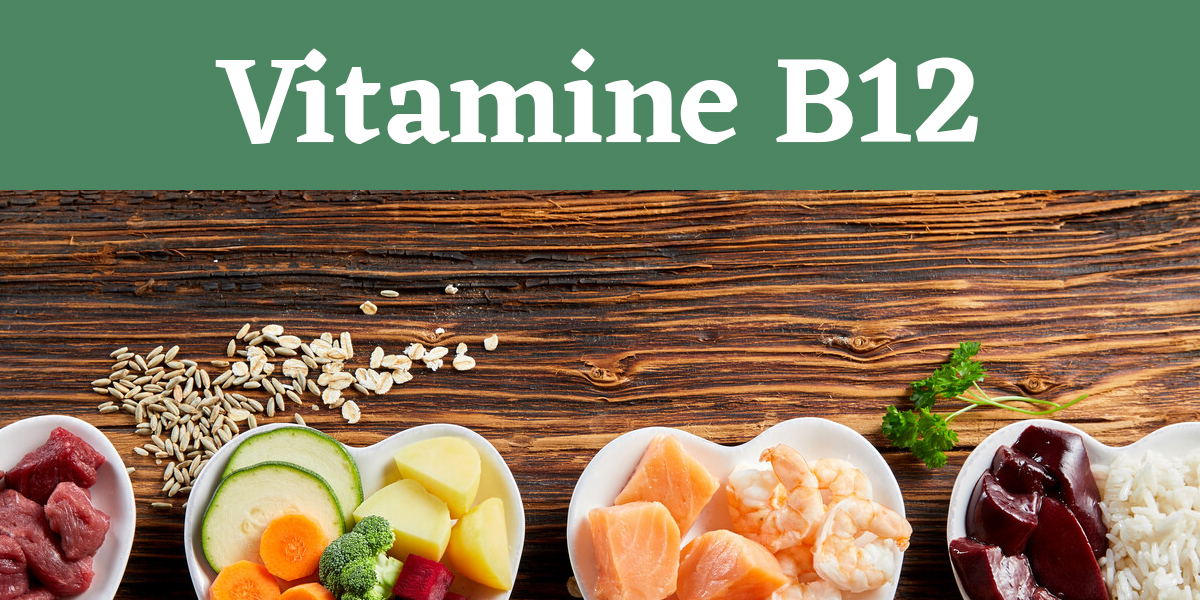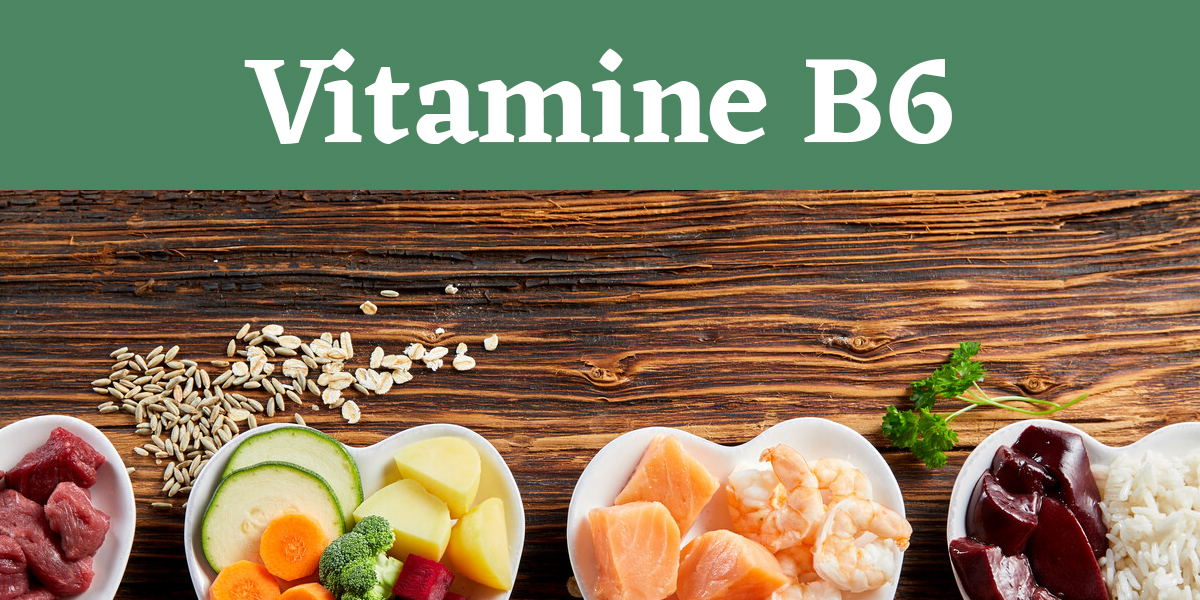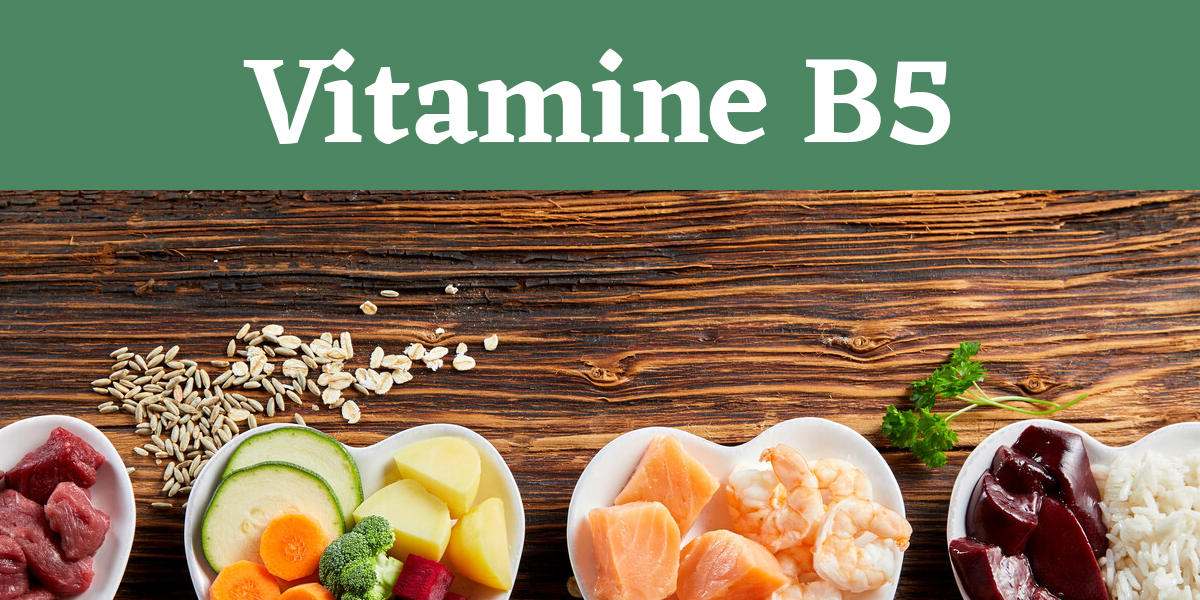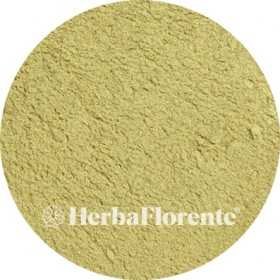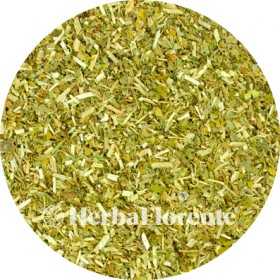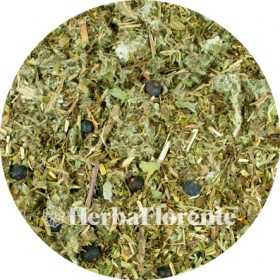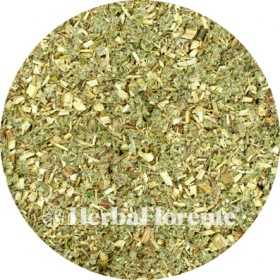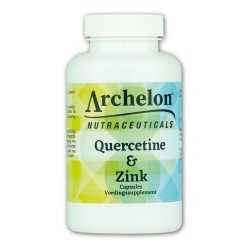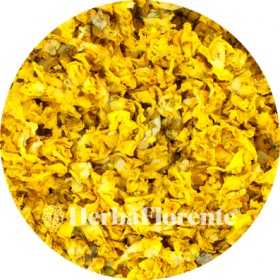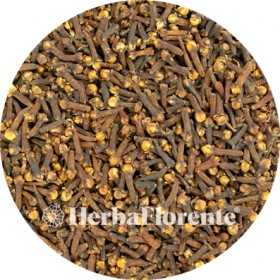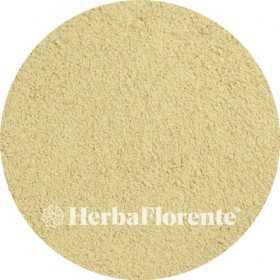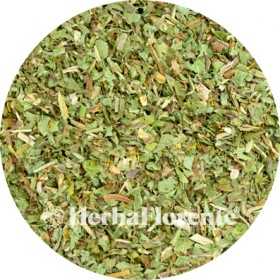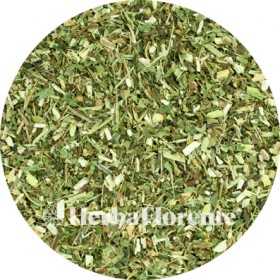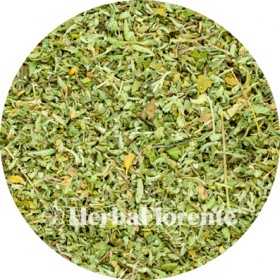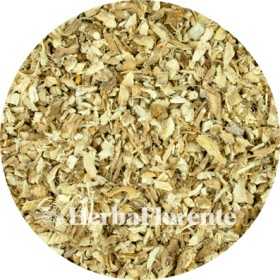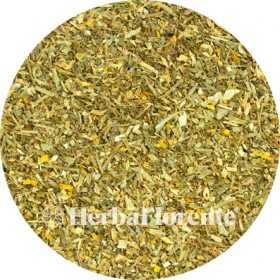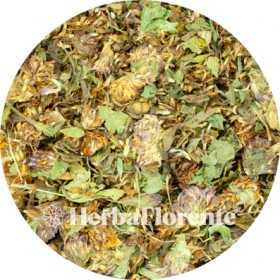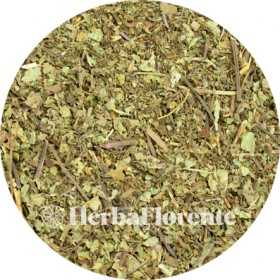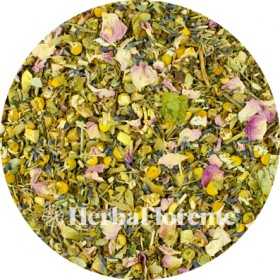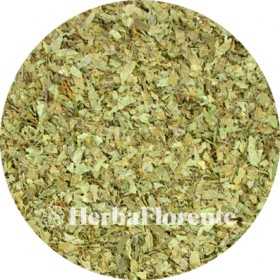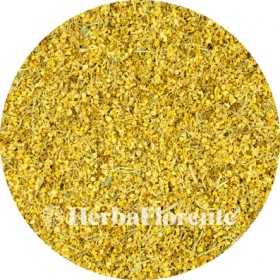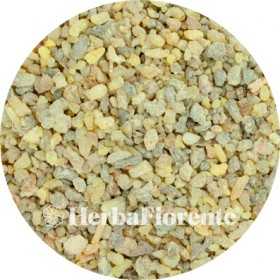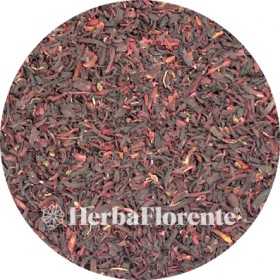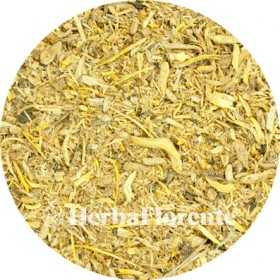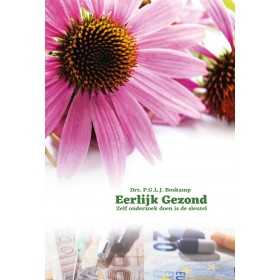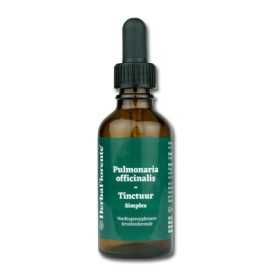Best sellers
There are 311 products.
Wormwood Herb - Artemisia absinthium
Absinthe wormwood (Artemisia absinthium) is a plant from the composite family (Asteraceae). This species is on the Dutch Red List of plants as quite rare and moderately reduced in numbers. It is a perennial plant that grows naturally on dry, calcareous, nitrogen-rich and cultivated soils in temperate regions of Europe, Asia and North Africa. The genus name Artemisia is derived from the Greek hunting goddess Artemis.
The buds of wormwood absinthe are traditionally seen as medicinal. The bitter extract of these buds is an important ingredient in drinks such as vermouth and classic absinthe. The most important flavorings are absinthine and the menthol-smelling terpene thujone.
The buds of wormwood absinthe are traditionally seen as medicinal. The bitter extract of these buds is an important ingredient in drinks such as vermouth and classic absinthe. The most important flavorings are absinthine and the menthol-smelling terpene thujone.
€1.95
From: €1.95
Passionflower - Passiflora incarnata
Passionflower (Passiflora incarnata) is known as a traditional herb that has long been used to reduce stress and inner turmoil. Native people of Central and North America used various parts of the plant to relax and sleep better. It is a natural sedative.
Although the blue passion flower originally only grew in America, it can now be found almost everywhere. The flowers of the Passiflora incarnata are not only beautiful to look at, but also edible. In the fall, passion fruits grow and the leaves are also edible. These leaves are rich in tannins, flavanols, saponins, choline and magnesium.
Although the blue passion flower originally only grew in America, it can now be found almost everywhere. The flowers of the Passiflora incarnata are not only beautiful to look at, but also edible. In the fall, passion fruits grow and the leaves are also edible. These leaves are rich in tannins, flavanols, saponins, choline and magnesium.
€2.00
From: €2.00
Detox (Blood-Liver-Kidney) Herbal Tea
Herbal tea composed of various herbs
Support for detox, Blood, Liver and Kidneys
Support for detox, Blood, Liver and Kidneys
€3.95
Mugwort - Artemisiae vulgaris - Cut
The mugwort (Artemisia vulgaris) is a plant from the composite family (Asteraceae), related to wormwood. This weakly aromatic plant has leaves that have white felt-like hairs on the underside. Mugwort is widespread in Belgium and the Netherlands, often found on wasteland and along roads. The plant thrives best in sandy soil. The stem is 60–120 cm long and often shows a reddish color.
In ancient times, the Romans put mugwort in their footwear to relieve fatigue and pain. In central Mongolia, where the population used to suffer from clouds of large mosquitoes (the size of small shrimps), the Mongolian mugwort (with its characteristic bluish, hairy, succulent leaves) was used to repel these mosquitoes in the damp lawns.
In ancient times, the Romans put mugwort in their footwear to relieve fatigue and pain. In central Mongolia, where the population used to suffer from clouds of large mosquitoes (the size of small shrimps), the Mongolian mugwort (with its characteristic bluish, hairy, succulent leaves) was used to repel these mosquitoes in the damp lawns.
€1.50
From: €1.50
Quercetin & Zinc
Quercetin is a flavonoid, also called bioflavonoid. This natural plant compound is found in various plants, fruits and vegetables. Flavonoids are responsible for the vibrant colors (pigments) in these plants and come in various shades. They play a crucial role in plant metabolism, regulate growth, and provide protection against UV light, oxidation and heat.
Zinc is available in different forms. Zinc bisglycinate has a very good bioavailability. It is a chelated form of zinc bound to two (bis) molecules of the amino acid glycine which has more benefits for the body. Zinc has a very wide range of action and is involved in many body processes. Zinc is essential for the activity of more than 300 enzymes that have the zinc ion as a cofactor.
Zinc is available in different forms. Zinc bisglycinate has a very good bioavailability. It is a chelated form of zinc bound to two (bis) molecules of the amino acid glycine which has more benefits for the body. Zinc has a very wide range of action and is involved in many body processes. Zinc is essential for the activity of more than 300 enzymes that have the zinc ion as a cofactor.
€34.95
Mullein - Verbascum thapsus
The mullein (Verbascum thapsus) is a member of the marram family (Scrophulariaceae) and mainly thrives in dune and chalk areas, where it is quite common. This plant is rare to find elsewhere in the Netherlands.
The flowers of the mullein are yellow and have a diameter of 1.5–3 cm. They consist of five connate petals, five sepals and five stamens, three of which are covered with yellow or white hairs. The flowers grow in dense spikes and bloom from July to autumn. An adult plant can reach a height of more than two meters.
The flowers of the mullein are yellow and have a diameter of 1.5–3 cm. They consist of five connate petals, five sepals and five stamens, three of which are covered with yellow or white hairs. The flowers grow in dense spikes and bloom from July to autumn. An adult plant can reach a height of more than two meters.
€4.50
From: €4.50
Clove - Syzygium aromaticum - Whole
Clove (Syzygium aromaticum) is the dried, fragrant flower bud of the clove tree. The main active ingredient is eugenol, which also promotes the antioxidant properties of cloves. Clove is known for its antioxidant effect and supports healthy digestion. In addition, it improves blood circulation and soothes the throat.
€2.50
From: €2.50
Slippery Elm - Ulmi pubescent - Ulmus rubra
The Slippery elm (Ulmus rubra), also known as slippery elm, was initially mistaken for the Ulmus americana in 1753. It was not until 1793 that researchers discovered that it was a different species and gave it the name Ulmus rubra. This deciduous tree is mainly found in the humid highlands east of North America.
The slippery elm has traditionally had many uses in America. The tree grows quickly and produces durable wood that does not rot quickly. The strong fibers are often used to make thread or rope and are even suitable for clothing production.
The inner bark of the slippery elm is slimy and is often used to make tea. The dried and ground leaves are also used as tea.
The slippery elm has traditionally had many uses in America. The tree grows quickly and produces durable wood that does not rot quickly. The strong fibers are often used to make thread or rope and are even suitable for clothing production.
The inner bark of the slippery elm is slimy and is often used to make tea. The dried and ground leaves are also used as tea.
€9.30
From: €9.30
Dandelion (Herb) - Taraxum officinale - Cut
Dandelion (Taraxacum officinale) has been known for centuries for its ability to support liver and gallbladder function. Both the root and the above-ground parts of the plant are rich in nutrients. In addition, dandelion has a beneficial effect on digestion.
The rich nutritional value of dandelions makes it advisable to regularly pick some fresh leaves in the wild and add them to salads. They are especially tasty in the spring. The fresh yellow flowers can be used as a cheerful decoration in salads and dried they can be processed into a 'wild' herbal tea.
Dandelions contain a high level of bitter substances, which always indicates that they are beneficial for liver and gallbladder function.
The rich nutritional value of dandelions makes it advisable to regularly pick some fresh leaves in the wild and add them to salads. They are especially tasty in the spring. The fresh yellow flowers can be used as a cheerful decoration in salads and dried they can be processed into a 'wild' herbal tea.
Dandelions contain a high level of bitter substances, which always indicates that they are beneficial for liver and gallbladder function.
€2.20
From: €2.20
Echinacea (Coneflower) (Herb) - Echinaceae purp.
Purple coneflower (Echinacea purpurea) is one of the most widely grown and used herbs in the world because of its positive influence on the immune system. The genus name 'echinacea' is derived from the Greek word 'echinos', meaning 'hedgehog', because of the spiky flower cone. Since the beginning of the last century, much research has been done into Echinacea purpurea in Europe.
This plant has a rich history and originally comes from North America. Indigenous tribes used this perennial plant for its beneficial effects on the immune system. Colonist doctor H.C.F. Meyer adopted this knowledge from the indigenous population and brought the first product based on echinacea onto the market in 1871.
This plant has a rich history and originally comes from North America. Indigenous tribes used this perennial plant for its beneficial effects on the immune system. Colonist doctor H.C.F. Meyer adopted this knowledge from the indigenous population and brought the first product based on echinacea onto the market in 1871.
€1.95
From: €1.95
Damiana - Damianae mex. (Turnera diffusa) - Cut
Damiana (Turnera diffusa) is a shrub native to southern Texas in the United States, as well as Central America, Mexico, South America and the Caribbean. It belongs to the Passifloraceae family and has been used by the Mayan Indians for centuries for its known effects on libido. Both men and women benefit from the libido-supporting properties of damiana, which is also known for its stress-reducing effect.
In Mexico, women often prepare tea from the fragrant leaves of the damiana shrub or smoke them to stimulate their feelings of pleasure. Damiana leaf contains several active substances, including beta-sitosterol, arbutin and alkaloids.
In Mexico, women often prepare tea from the fragrant leaves of the damiana shrub or smoke them to stimulate their feelings of pleasure. Damiana leaf contains several active substances, including beta-sitosterol, arbutin and alkaloids.
€2.70
From: €2.70
ILHWA Korean Ginseng Capsules
These capsules are of very high quality thanks to the special process to extract the ginseng roots, developed by ILHWA to preserve the essential, vital elements of the ginseng root (called ginsenosiden). The capsules are easy to take.
100% ginseng root powder.
Panax Ginseng is a plant with a slow-growing, sturdy root. Panax Ginseng is considered one of the most important medicinal herbs in traditional Chinese medicine. In fact, it is even the world's most famous herb. Panax ginseng has been used for more than 5,000 years to optimize human health and well-being in Asia. In the world of Chinese ethnopharmacology, it has been used for more than 3,000 years.
100% ginseng root powder.
Panax Ginseng is a plant with a slow-growing, sturdy root. Panax Ginseng is considered one of the most important medicinal herbs in traditional Chinese medicine. In fact, it is even the world's most famous herb. Panax ginseng has been used for more than 5,000 years to optimize human health and well-being in Asia. In the world of Chinese ethnopharmacology, it has been used for more than 3,000 years.
€28.40
€35.50
From: €28.40
Marshmallow (Root) - Althaea officinalis
Marshmallow (Althaea officinalis) belongs to the mallow family (Malvaceae) and has been spread worldwide by human activity, especially to areas with suitable soil, humidity and climate.
The starch in the carrot, mixed with proteinaceous substances, was formerly used in making marshmallows and bacon. The leaves can be eaten cooked and the flowers can be used raw in salads.
In the medicinal field, marshmallow root has a soothing effect on the respiratory tract (source WHO) and is used in cough syrups.
The starch in the carrot, mixed with proteinaceous substances, was formerly used in making marshmallows and bacon. The leaves can be eaten cooked and the flowers can be used raw in salads.
In the medicinal field, marshmallow root has a soothing effect on the respiratory tract (source WHO) and is used in cough syrups.
€2.50
From: €2.50
California Poppy - Eschscholzia californica
California Poppy, also known as golden poppy (Eschscholtzia californica), is a plant with golden yellow flowers that belongs to the poppy family. It owes this name to its soothing properties, which help with natural, healthy sleep and stress reduction.
This plant is native to California, hence the name. The indigenous people of America traditionally used golden poppy as a sedative herb and to help them sleep better. The aerial parts of the golden poppy contain several active substances, including quinolide alkaloids, rutin, phytosterols, carotenoids and cyanogen glycosides.
This plant is native to California, hence the name. The indigenous people of America traditionally used golden poppy as a sedative herb and to help them sleep better. The aerial parts of the golden poppy contain several active substances, including quinolide alkaloids, rutin, phytosterols, carotenoids and cyanogen glycosides.
€2.00
From: €2.00
Red Clover (Flower) - Trifolii Rubr. pratense - Whole
Red clover (Trifolium pratense) grows naturally in Europe and Central Asia. Usually the leaves of red clover have three parts and a light purple flower blooms in the middle. In addition to the high content of isoflavones, which are bioactive substances that fall under polyphenols, the flower heads of red clover are also rich in vitamin C, B1, B2, B3, beta-carotene and choline.
Red clover can help with menopausal symptoms such as hot flashes, mood swings and irritability. In addition, it supports heart health and contributes to the condition of the blood vessels. It can also be used to maintain strong bones.
Red clover can help with menopausal symptoms such as hot flashes, mood swings and irritability. In addition, it supports heart health and contributes to the condition of the blood vessels. It can also be used to maintain strong bones.
€2.00
From: €2.00
Kumis Kutjing - Cat's whiskers - Orthosiphon aristatus - Cut
Out-of-Stock
Cat's whisker (Orthosiphon aristatus), also known as Kumis Kutjing, has played an important role in Ayurvedic medicine for centuries due to its beneficial properties in treating urinary tract infections.
This plant belongs to the Lamiaceae family and thrives mainly in tropical and subtropical regions, preferring locations such as wetlands, along rivers and swamps, especially in Southeast Asia, especially Malaysia and Java. The name "cat's whisker" is derived from the white or lilac flowers with striking, thread-like stamens, sometimes up to 3 cm long.
This plant belongs to the Lamiaceae family and thrives mainly in tropical and subtropical regions, preferring locations such as wetlands, along rivers and swamps, especially in Southeast Asia, especially Malaysia and Java. The name "cat's whisker" is derived from the white or lilac flowers with striking, thread-like stamens, sometimes up to 3 cm long.
€1.95
From: €1.95
Sleep Tight Herbal Tea
Herbal tea composed of various herbs
Nice before going to sleep
Nice before going to sleep
€3.95
Asian Pennywort (Gotu kola) - Hydrocotyles Folium (Centella asiatica)
Asian pennywort also known as Gotu kola(Centella asiatica), is a plant that thrives in Southeast Asia and plays a central role in Ayurvedic medicine. Due to its diverse active substances, Asian pennywort is widely used in herbal medicine. It is known for supporting cognitive functions such as memory, concentration and learning, and it is also used to promote healthy blood circulation and vascular function.
Asian pennywort is a delicate plant with creeping stems and small, rounded leaves, often accompanied by white or pink flowers. The main bioactive compounds in Asian pennywort are triterpene glycosides, alkaloids and essential oils.
Asian pennywort is a delicate plant with creeping stems and small, rounded leaves, often accompanied by white or pink flowers. The main bioactive compounds in Asian pennywort are triterpene glycosides, alkaloids and essential oils.
€3.50
From: €3.50
Elder - Sambuci nigri
The elder (Sambucus nigra L.) is a native tree/shrub in the Netherlands that is widespread in various places in our country. Towards the end of May the elder tree blooms and produces large umbels of small, creamy white flowers that give off a sweet, floral scent. These blossoms are used to make elderflower liqueur, syrup or pancakes. In addition to their delicious taste, the blossoms are also rich in substances, including up to 3% flavonoids such as rutin, quercetin and astragalin. In addition, they contain tannins (tannins), triterpenes, fatty acids and essential oil.
€2.95
From: €2.95
Olibanum Idian - Boswelia serrata
Olibanum Idian (Boswellia serrata) is a medium to large deciduous tree with a slightly open crown and branches that hang slightly. This tree belongs to the Burseraceae family and is native to India and the Punjab area.
Olibanum Idian is extracted from the resin of the tree. Extracts of Boswellia serrata have been clinically studied for osteoarthritis and joint pain, showing a slight improvement in pain and function. In traditional Ayurveda it is used for diabetes.
Boswellia serrata produces several forms of boswellic acids, such as β-boswellic acid, acetyl-β-boswellic acid, 11-keto-β-boswellic acid and acetyl-11-keto-β-boswellic acid.
Olibanum Idian is extracted from the resin of the tree. Extracts of Boswellia serrata have been clinically studied for osteoarthritis and joint pain, showing a slight improvement in pain and function. In traditional Ayurveda it is used for diabetes.
Boswellia serrata produces several forms of boswellic acids, such as β-boswellic acid, acetyl-β-boswellic acid, 11-keto-β-boswellic acid and acetyl-11-keto-β-boswellic acid.
€2.50
From: €2.50
Hibiscus - Hibiscus sabdariff
The Hibiscus (Hibiscus sabdariffa) is traditionally used in hot and cold drinks, as a flavoring and coloring agent in the food industry, and as a herbal remedy for its ability to reduce fatigue and promote cardiovascular health.
Hibiscus sabdariffa L. is an annual shrub that can grow more than two meters high. The shrub usually has smooth, red stems and cream or pale yellow flowers that turn pink when they wilt at the end of the day. At that time, a characteristic red calyx grows, which is fleshy, crispy and juicy. This calyx turns brown and bursts open when it is dry and grown. The calyx, stems and leaves have a sour taste reminiscent of cranberries.
Hibiscus sabdariffa L. is an annual shrub that can grow more than two meters high. The shrub usually has smooth, red stems and cream or pale yellow flowers that turn pink when they wilt at the end of the day. At that time, a characteristic red calyx grows, which is fleshy, crispy and juicy. This calyx turns brown and bursts open when it is dry and grown. The calyx, stems and leaves have a sour taste reminiscent of cranberries.
€1.95
From: €1.95
Angelica - Angelica angelicae
The angelica (Angelica archangelica), also known as archangelica, belongs to the umbellifer family (Apiaceae). This plant thrives in moist, very nutrient-rich soil along water edges, such as the IJsselmeer, river banks and in osier banks. In addition, the angelica is also grown in gardens.
Historically, angelica is known for its medicinal properties. The plant is still grown locally from central Germany to Turkestan. A sweet-smelling oil known as angelica oil is extracted from the seeds and roots, which is used in the cosmetic industry, liquor distilleries and bakeries. In addition, the stems and petioles are often candied because of their sweet and fragrant taste.
Historically, angelica is known for its medicinal properties. The plant is still grown locally from central Germany to Turkestan. A sweet-smelling oil known as angelica oil is extracted from the seeds and roots, which is used in the cosmetic industry, liquor distilleries and bakeries. In addition, the stems and petioles are often candied because of their sweet and fragrant taste.
€2.20
From: €2.20
Lungwort Tincture - Pulmonaria officinalis Tinctuur
Single herbal tincture made with dried leaf of Pulmonaria officinalis (Lungwort).
Lungwort, belonging to the genus Pulmonaria in the rough-leaved family (Boraginaceae), owes its botanical name to the Latin word 'pulmo', which means 'lung'. This is because of the similarity that was seen between the drawing on the leaves of the spotted lungwort and (diseased) human lungs. According to the signature theory, the plant was previously used as a remedy for lung diseases because of this similarity. The Dutch name 'pulmonary herb' is directly derived from the botanical name, and this name also occurs in several other Western European languages.
Lungwort, belonging to the genus Pulmonaria in the rough-leaved family (Boraginaceae), owes its botanical name to the Latin word 'pulmo', which means 'lung'. This is because of the similarity that was seen between the drawing on the leaves of the spotted lungwort and (diseased) human lungs. According to the signature theory, the plant was previously used as a remedy for lung diseases because of this similarity. The Dutch name 'pulmonary herb' is directly derived from the botanical name, and this name also occurs in several other Western European languages.
€11.95

